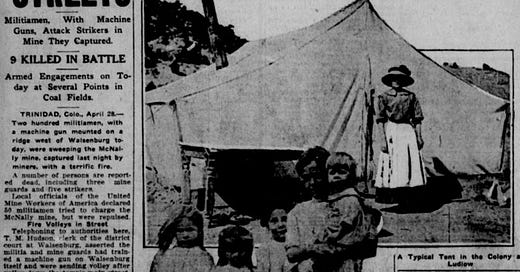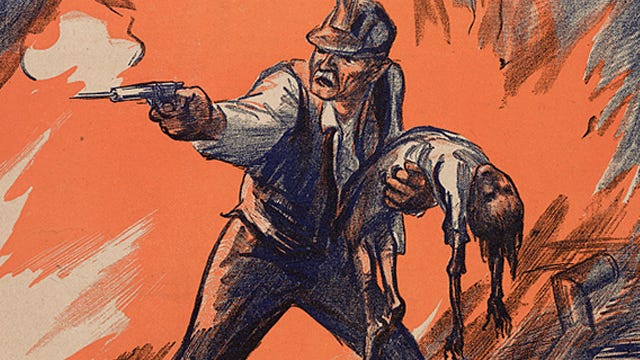The Ludlow Massacre: A Tragic Reminder of How All-American Greed Took Innocent Lives
When Workers Fought Back for this Labor Day
The Ludlow Massacre: A Tragic Reminder of How All-American Greed Took Innocent Lives by Cindy Sheehan
Here in the good ol’ USofA, any gains made by people outside of the original owners of “liberty:” what I have called WaMPOs (White, Male, Property Owners) have had to be secured with IMMENSE sacrifice: From the anti-slavery movement, to the women’s suffragette movement, to the labor movement, etc. The WaMPOS still won’t give up a penny of profit to honor basic human rights. One such glaring crime against humanity happened in 1913 in Ludlow, CO when miners had the “temerity” to demand better wages and working conditions. The Ludlow tent site was a small outpost of the Colorado Coalfield Wars. One robber baron, especially, the notorious John D. Rockerfeller was not having any of that.
It's been over a century since the deadly Ludlow Massacre took place, but its shocking events continue to haunt us to this day. The massacre was one of the most vicious and tragic incidents in American history, during which innocent men, women, and children were violently killed for the simple act of demanding better working conditions and rights. The massacre serves as a stark reminder of the dark side of capitalism, the tragedy of unchecked corporate greed, and the lengths to which powerful individuals and corporations will go to protect their profits.
To understand the Ludlow Massacre, we must first understand the conditions that led to it. In the early 1900s, coal miners in southern Colorado were working for the Colorado Fuel and Iron Company, a subsidiary of Rockefeller's Standard Oil. The miners, who were mainly immigrants, were forced to live in squalid shantytowns owned by the company, where they were charged exorbitant rent and had to buy food and other basic necessities from the company store. The miners were paid very little, and the work was dangerous, with frequent cave-ins and explosions.
In September 1913, the United Mine Workers of America (UMWA) called for a strike to demand better working conditions and wages. The strike gave the miners a sense of solidarity and hope for a better future. But the company was not willing to budge and hired the notorious Baldwin-Felts Detective Agency to brutalize the striking miners. The Baldwin-Felts detectives were known for their ruthless tactics, including evictions of striking miners from their homes and using machine guns to intimidate the strikers.
Despite the violence, the miners refused to back down. Instead, they built tent colonies near the mines where they could live with their families and protect themselves from the Baldwin-Felts agents. One such tent colony was built in Ludlow, which became the epicenter of the strike. The tent colony represented a serious threat to the Colorado Fuel and Iron Company, which saw it as a symbol of defiance against their authority.
On April 20, 1914, the company, with the help of the National Guard, launched a brutal attack on the tent colony. The attack lasted for ten hours, during which the soldiers used machine guns and burned the tents with women and children inside. By the end of the day, over twenty people, including women and children, had been killed, and countless others were injured. The massacre made national headlines and sparked outrage across the country.
Although the massacre was initially blamed on the National Guard, it soon became clear that the Colorado Fuel and Iron Company was the real culprit. John D. Rockefeller had a lot to answer for. He had created a system that exploited the workers and their families, and he had hired the Baldwin-Felts detectives, who were responsible for much of the violence against the strikers, and were savage strike-breakers throughout their collaboration with robber barons. The massacre was a direct result of Rockefeller's greed and his willingness to use violence and intimidation to protect his profits.
The Ludlow Massacre was a tragic event in American history that exposed the cruel reality of unchecked corporate greed. The event showed that the powerful and wealthy individuals and companies would stop at nothing to protect their interests, even if it meant murdering innocent men, women, and children. The massacre was a wakeup call to the people of America, who demanded reforms and better working conditions. The events of the Ludlow Massacre have continued to inspire people to fight for their rights and the rights of others and to demand that those in power be held accountable for their actions.
Today, if workers have ANY rights, or, ANY safe working conditions, we should honor the sacrifices of those in the past AND demand that organized labor of today put their workers at the forefront of their activities, and not the Democrat party.
What do you think on “Labor” Day?
For as little as 14 cents a day ($50 yearly), you can support the work of Cindy Sheehan’s Soapbox!
Thanks for being a loyal reader of Cindy Sheehan’s Soapbox, we need your financial help if you are able.
We have different tiers of support: $5/month; $50/year, or $100 as a founding member.
Checks/money/orders/cash/etc can be snail-mailed to:
Cindy Sheehan’s Soapbox, LLC
PO BOX 6264, VACAVILLE, CA 95696
PayPal: cindysheehanssoapbox@gmail.com






Thanks for sharing Cindy. There is a film “Salt of the Earth” which is a film that was blacklisted during the 50s which documented the struggle of copper mine workers in Southwest New Mexico. It’s worth watching as it shows how the women and children made a difference. I only learned about this historical event when I moved to the heart of this area where it took place.
Sadly, the Labor Movement seems to have evaporated, along with the Anti War Movement. The so-called leaders turned into collaborators and betrayed the trust of their members. I was a Steelworker for a time in my youth before Reagan began his union busting. I was very hopeful back then that a better society was actually possible. Very naive I guess.🤔